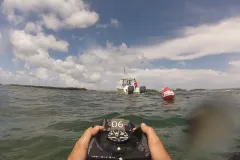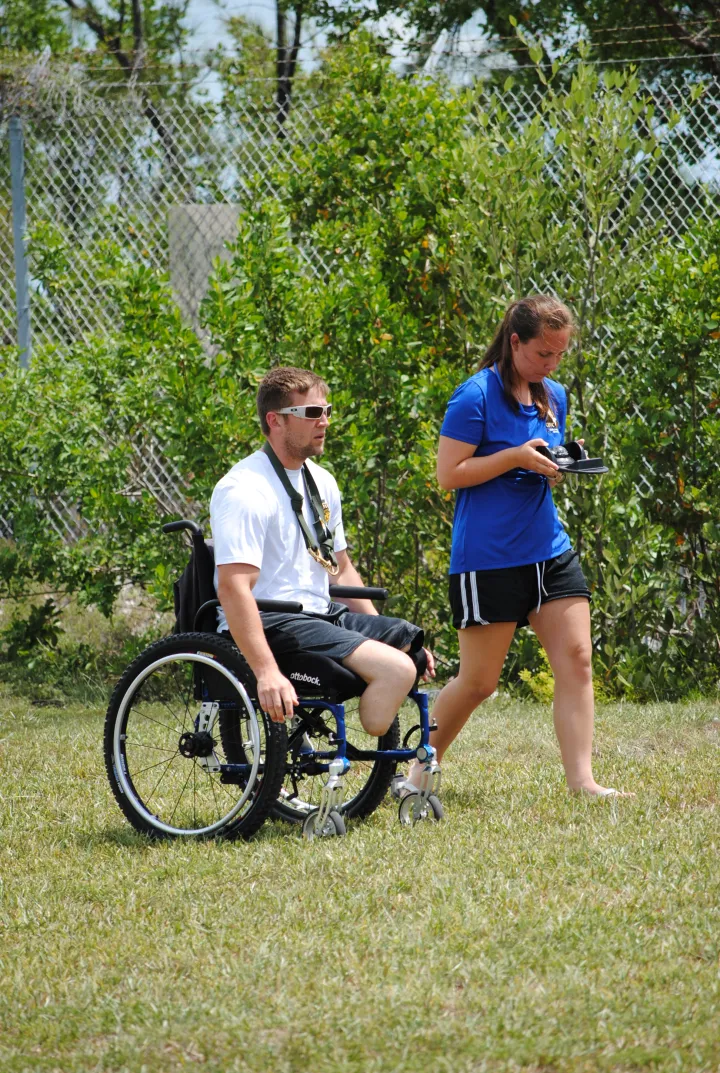SCUBAnauts Splitting The Sign

I am a member of SCUBAnauts International, an organization for young people passionately interested in the ocean. Of all my experiences as a SCUBAnaut, sharing my love of the ocean with wounded veterans really stands out. As we come up to Memorial Day, I wanted to share what this has meant for me.
It was the summer of 2012, and salt water cascaded into my mouth as I emerged above the water's surface. Sputtering for a few moments, I managed to clear my airway and take a deep gulp of fresh air. My legs were burning. Blinking rapidly I swiveled my head to get a clear view of my diving partner, Pete, who lost his left foot during a military training exercise in 1997. His chest was rising and falling faster than mine, and just beneath his tan you could see his face slightly flushed a coral pink from the swim. His tank leaned against the algae-encrusted rocks along the Florida shore. With a mighty guffugh, he rose from the ground. He held out his hand and I grasped it gratefully. Even with two legs, I was the one who needed the stability.
Pete hauled me up and slapped me on the back like we had just won an Olympic medal. I squinted up to see his face and grinned. In a way, we kind of did win. The only difference between our swim and an Olympic swim was that we were tethered together by rope. I guess there were some other differences: we had tanks strapped to our backs and I held a compass inches from my nose as we navigated through a 750-meter channel of murky water to a dive sign on the shoreline. Beat that, Michael Phelps.
So what brought us here? SCUBAnauts International had paired teenagers in the SCUBAnauts program with veterans from the Combat Wounded Veterans group, and had them undergo an underwater navigational course in Key West. Initially, I assumed the exercise was just that: an exercise to help us use a compass. It wasn’t until after the dive that I realized it was more than that. It bridged two people (usually polar opposites in terms of physique, age, gender, and personality) and made them rely on teamwork to achieve a shared goal. For an entire day, buddy pairs made up of a teenage science diver and a wounded veteran learned how to navigate together. First, we were taught how to shoot our azimuth—a fancy word for compass bearing. Next, we practiced our compass work on land, and then it was time to try to navigate underwater with currents, waves and all.
According to our instructor from the Army Special Forces Underwater Operations School, some of the Navy Seal trainees don't even manage to reach the red and white dive sign when completing this exercise. Today though, a fifteen-year old girl (me!) and an amputee Veteran managed to split the sign (a term only used to address those who navigated the channel and arrived at the intended target) in half.
Throughout the experience, I gained insight and knowledge that I will carry with me for years. For example, I learned that just because you have a steel leg doesn’t mean you can’t have rocking neon or camouflage socks. On a more serious note, the wounded Vets taught me what real strength feels like. In my first year, my partner and I were the only ones who hit the sign, which made me feel extremely powerful. In my second year, we were off by fifty meters—yet I still felt powerful. The win isn't what makes you strong. The acid build-up in our muscles as we swam wasn’t the evidence of our strength. Trusting your partner and believing in yourself to reach the shore through any physical and mental challenge is what real power feels like. Even when you can’t see anything around you. Even if you have a missing limb. Even if there is a current. Even if you can’t think straight because of how tired you are. Power is choosing to live life to the fullest. Which is exactly what I do every summer with the Combat Wounded Veterans.


